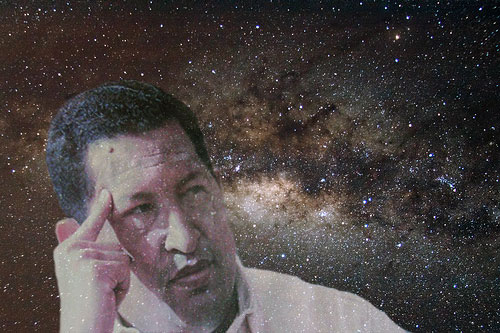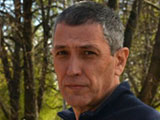Hugo Chávez and the Elegant Universe
by Israel Centeno and translated by Kelly V. Harrison / February 12, 2013 / No comments
Chávez’s ongoing disappearance raises questions about whether he is alive, dead, or both.

Image created by Sampsonia Way. Via: blmurch and Dave Young.
It is difficult to understand Venezuela and Hugo Chávez, let alone attempt to explain them. Many try to do so using their knowledge of economic and political science, or by means of the intelligence agencies that are interested in Caracas, the center of the Bolivarian revolution. Though today Caracas seems a bit like Berlin during the Cold War, full of intrigue, counter-information, espionage, and counter-intelligence.

- From his lonely watch post Albert Camus asked who among us has not experienced exile yet still managed to preserve a spark of fire in their soul. “We’re all alone,” Natalia Sedova cried in exile on hearing of her husband Leon Trotsky’s affair with Frida Kahlo. In his novel Night Watch, Stephen Koch follows the incestuous love affair of David and Harriet, wealthy siblings watching the world from their solitary exile. Koch’s writing, Camus’s theories, and Trotsky’s affair all come back to exile and lead me to reflect on the human condition. From my own vantage point, my Night Watch, I will reflect on my questions of exile, writing, and the human condition.

- Israel Centeno was born in 1958 in Caracas, Venezuela, and currently lives in Pittsburgh as a Writer-in-Residence with City of Asylum/Pittsburgh. He writes both novels and short stories, and also works as an editor and professor of literature. He has published nine books in Venezuela and three in Spain.
Any kind of explanation has to be considered within a framework; a context must be offered to whoever is interested in interpreting the reality.
But what reality?
From the center of power, they seem to toss us the dilemma as it is navigated by quantum physics and other sciences seeking to establish a theory of the elegant universe.
The question becomes: What is reality?
Suddenly Caracas, Venezuela, and its political reality seem holographic. A three-dimensional reality—or four-dimensional, if we add time—trapped within a two-dimensional structure. This manipulated hologram faces another hologram and others still, suggesting the existence of the multiverse, evidence that it is impossible to interpret a single reality without considering many others. Thus, as the center of power disappears—or the president, in this case—so too does reality.
As such, an unquestionable fact, like hitting your finger with a hammer, starts to be shadowed in doubt.
A bullet shot through the palm of a hand can be interpreted, reinterpreted, and shattered into a million microparticles until it becomes invisible and painless.
This is happening with the commander-president of the Bolivarian revolution; nobody can prove with any certainty whether or not he exists, or whether he is, has been, or was, ill. This is all but speculation, and yet it is not. Such paradoxes are manna for the scientists who delve into the endless mazes of macro and micro universes.
But things are not nearly as advanced as they seem. The holographic theories sometimes appear very elaborate, yet they seem to be more closely related to Schrödinger’s hypothesis.
In that light, Hugo Chávez is the cat in Havana. He is in a “closed and opaque” box. Hypothetically, there’s a 50% chance he’s terminally ill and dying, and a 50% chance he’s on the mend. Or, if you divide it into thirds, he’s 33.33% unwell, 33.33% healthy, and 33.33% recovering from a serious illness. Following this, if we consider the principle of wave superposition, we must have a Hugo Chávez who is neither terminally ill, nor dead, nor getting better, right up until we open the box and can see him.
With this principle in mind, the reality of the patient in Havana is not the only one that starts to control itself. The reality in Venezuela is doing the same and one can begin to wonder:
Is Caracas one of the world’s most violent cities? Has there been a significant social reversal under the auspices of the Bolivarian revolution? Is the government left-wing or right-wing? Did Nicolás Maduro usurp the presidency? Does Lieutenant Cabello hate him? Is he military or civilian? Is Venezuela a democracy or a dictatorship? The truth surrounding these things cannot be established until the box that contains them is opened, much like with Schrödinger’s cat. But which box is it? Where is it? This is where the theory of a three-dimensional reality trapped in a two-dimensional reality comes in, along with black holes and the political engineering of recent times. These realities run parallel to any orthodox or classical interpretation.




